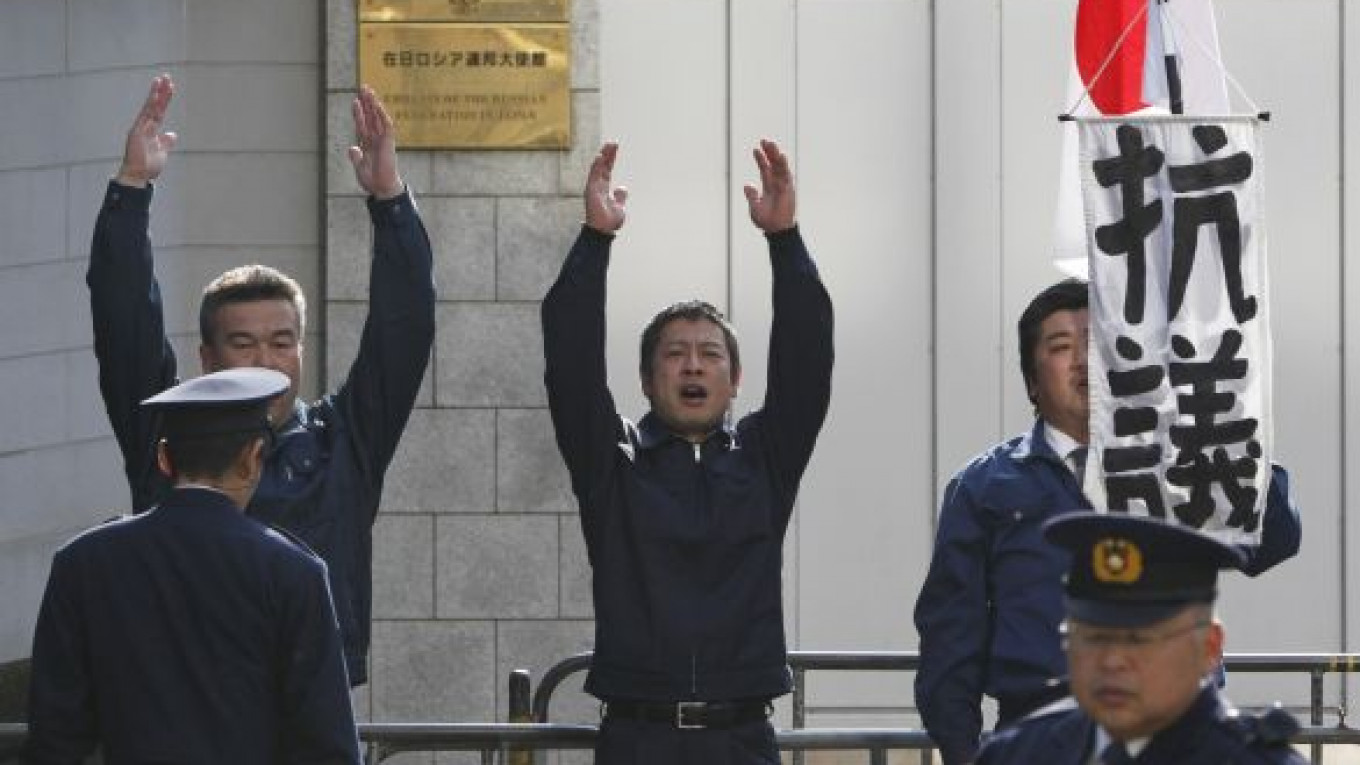Japan scrambled four fighter jets to intercept two Russian fighters it said invaded Japanese airspace near Russia's Kuril Islands for about 11 seconds on Thursday, as Japan celebrated a national day of commemoration calling for the disputed archipelago seized in World War II to return to the Japanese.
Russia's Defense Ministry denied that an intrusion had taken place and said it was conducting military exercises in the area. For months, Japan has been locked in a bitter territorial dispute with China over land in the East China Sea.
Japanese Prime Minister Shinzo Abe, elected in late December with promises to strengthen territorial defense, said at a rally earlier Thursday, Japan's Northern Territories Day, that his country would seek to find a "solution" to the dispute over the Kurils, which Japan calls the Northern Territories.
The national Northern Territories Day commemorates the anniversary of an 1855 treaty with Russia that solidified Japanese sovereignty over the islands. The day is marked by nationalist rallies across the country calling for the territory to be returned.
Originally, the islands were inhabited by neither the Japanese nor Russians, but by the indigenous Ainu people. Russia acquired the islands only in 1945, at the end of World War II.
The Allies' 1951 peace treaty with Japan — which, however, was not signed by the Soviet Union — renounced Japan's rights to the Kurils, but did not specify what islands would be internationally considered as part of the archipelago. In 1956, the Soviet Union offered Japan the Habomai and Shikotan islands, part of the Kuril chain, in exchange for a peace treaty. But only a joint declaration to end the war was signed, and the islands are still under Russian control.
Since then, the two countries' positions have not changed significantly. In the meantime, the parties have repeatedly discussed the issue. Although Russia has not budged over its claim to the islands, it has agreed to allow visa-free travel for the Japanese to visit the land and fish in the area.
Alexander Konovalov, head of the Institute for Strategic Assessment, told The Moscow Times that he did not see how, with all enduring territorial disputes, Japan could achieve significant progress on the issue. "The only way out of this situation is by using the islands jointly," he said. "For instance, Russia can soothe Japan's sentiments by allowing more cultural exchange."
Apart from its territorial disputes with Russia and China, Japan also contests sovereignty over the Liancourt Islets with South Korea.
Ruslan Pukhov, director of the Center for Analysis of Strategies and Technologies, said Russia feels vulnerable and isolated and, as such, is unlikely to make any significant concessions. "Russia was always part of a bigger whole. Today it feels lonely and isolated and, therefore, reacts to territorial disputes very acutely."
In 2010, then-President Dmitry Medvedev became the first Russian leader to visit the islands, sparking rebukes by the Japanese government. He returned for a second visit in July 2012. The islands have a significant strategic and economic value, with fish, oil and gold and silver deposits.
Contact the author at i.nechepurenko@imedia.ru
Related articles:
A Message from The Moscow Times:
Dear readers,
We are facing unprecedented challenges. Russia's Prosecutor General's Office has designated The Moscow Times as an "undesirable" organization, criminalizing our work and putting our staff at risk of prosecution. This follows our earlier unjust labeling as a "foreign agent."
These actions are direct attempts to silence independent journalism in Russia. The authorities claim our work "discredits the decisions of the Russian leadership." We see things differently: we strive to provide accurate, unbiased reporting on Russia.
We, the journalists of The Moscow Times, refuse to be silenced. But to continue our work, we need your help.
Your support, no matter how small, makes a world of difference. If you can, please support us monthly starting from just $2. It's quick to set up, and every contribution makes a significant impact.
By supporting The Moscow Times, you're defending open, independent journalism in the face of repression. Thank you for standing with us.
Remind me later.






